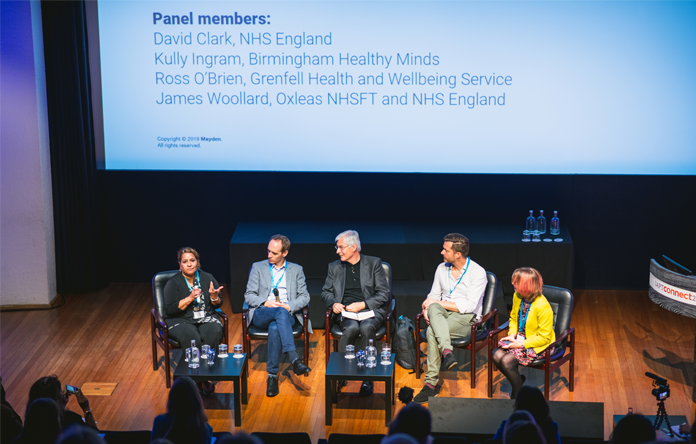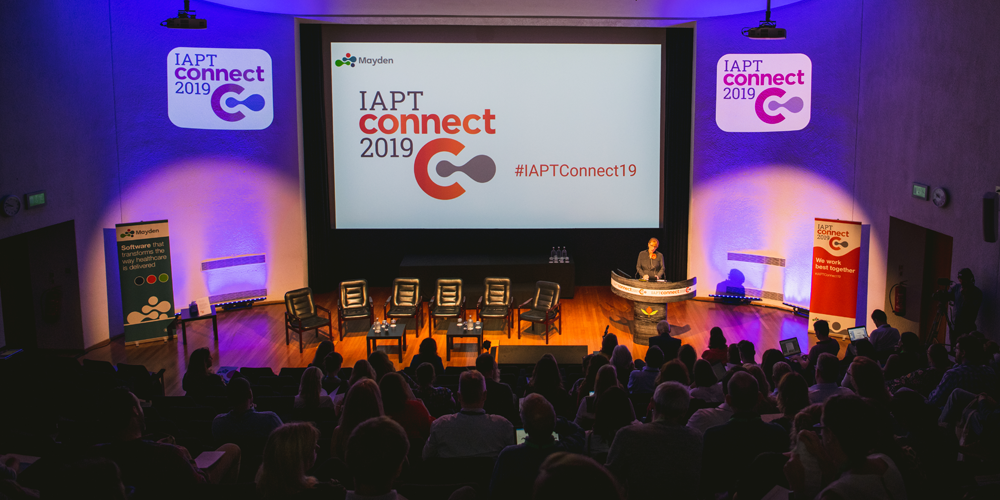A huge thank you to our fantastic speakers, poster contributors, exhibitors and all who joined us at IAPT Connect 19 which took place at the Royal College of Physicians on Thursday, 26 September.
It was a pleasure to bring together so many passionate individuals to talk about the future of our mental health services, to learn from and be inspired by one anothers’ experiences.
At Mayden, we believe the best solutions emerge when people come together to face their current and future challenges, and we created IAPT Connect as a space to do just that. It’s a chance to share experiences, be inspired and explore the future of psychological therapy services together.
The day’s agenda centred around good service delivery for the benefit of patients and healthcare teams, and on the vital role that data and digital technology have to play.
Looking for presentation slides and videos? Join our LinkedIn group for access.
We are also posting summaries of each presentation on our blog, and you can listen to podcast interviews from Mental Elf with each of our speakers, which were recorded on the day. You can also download the complete event guide here.

Opening address
Pooky Knightsmith, Mental health advisor, educator, speaker and author.
Pooky joined us in her capacity both as a mental health professional and as a recipient of mental health care, and dedicated her inspiring opening remarks to the power of human connection.

IAPT at 11: Achievements and future developments
David Clark, NHS England’s National Clinical and Informatics Advisor for IAPT
The IAPT programme has inspired similar models across the globe. David reviewed the growth and success of this landmark service in its first decade and looked at the future developments needed to achieve the expansion of IAPT set out in the NHS Long Term Plan.


The future for digital technology in mental health
Indra Joshi, Head of Digital Health and AI, NHSX
James Woollard, Senior Clinical Fellow, NHS England
Indra and James explored how digital technology is likely to shape healthcare, considered the standards and evidence framework that will be needed, and shared findings from the Topol review on how mental health teams can prepare.

Learning from the Grenfell Health and Wellbeing Service
Ross O’Brien. Digital Innovation Director, Grenfell Health and Wellbeing Service
Ross examined the response to the Grenfell tragedy and how virtual reality was used to reconnect with a traumatised and bereaved community who were distrusting of authority and statutory sector services.

Panel discussion: How can therapy teams prepare for the digital future?
Digital technologies can transform mental healthcare and improve the working lives of our teams. To be effective they must be accompanied by changes to the way we work. Our panel explored the challenges and discussed their ideas for how teams can prepare.

Data driven mental healthcare
Chris May, Founder and Managing Director, Mayden
Chris discussed the opportunities for digital technology and data to increase patient engagement, choice and delivery of effective treatment in stepped care psychological therapies.

Testing behavioural insights to increase patient engagement
Hugo Harper, Head of Health, Behavioural Insights Team
Hugo presented results of research carried out in partnership with Mayden which tested a low cost, non-clinical and scalable intervention with the aim of increasing the number of adult IAPT referrals attending treatment appointments.

Developing student wellbeing pathways
Morad Margoum, Senior Service Lead and Service Manager Steps2Wellbeing, Dorset Healthcare NHS Trust
Emma Spencer, Low Intensity and Assessment Team Lead IAPT Steps2Wellbeing, Dorset Healthcare NHS Trust
Kerry Rolls, Student Wellbeing Coordinator, Bournemouth University
The Steps2Wellbeing team talked about their work with local universities to develop student wellbeing pathways and how webinars and other digital innovations are helping to engage the student population.

Integrated psychological and social interventions
Nesta Reeve Consultant Clinical Psychologist and Clinical Lead, and Esmee Henstra, Social Team Lead Norfolk and Waveney Wellbeing Service, Norfolk and Suffolk NHS Foundation Trust
The Norfolk and Waveney Wellbeing Service runs an integrated psychological and social model in a partnership between NSFT, Mind and Relate. Lived experience plays a key role in the service and peer support workers are valued members of the team.

Making us matter: Are we different to our patients?
Rupal Panchal, Operational Lead and Senior Cognitive Behavioural Therapist, Wellbeing Matters, South East Staffordshire IAPT Midlands Partnership NHS Foundation Trust
Wellbeing Matters believes a resilient, thriving workforce is essential to delivering high quality mental healthcare. Rupal shared the successes her team has had in implementing multiple strategies to help raise awareness and improve wellbeing in the team.
Thank you again to all who attended.
Our mission at Mayden is to create digital technology that changes what’s possible for clinicians and patients. We look forward to continuing to support you as you shape the future of England’s psychological therapy services.
Finally, stay in the loop about upcoming events by signing up for our quarterly enewsletter.


